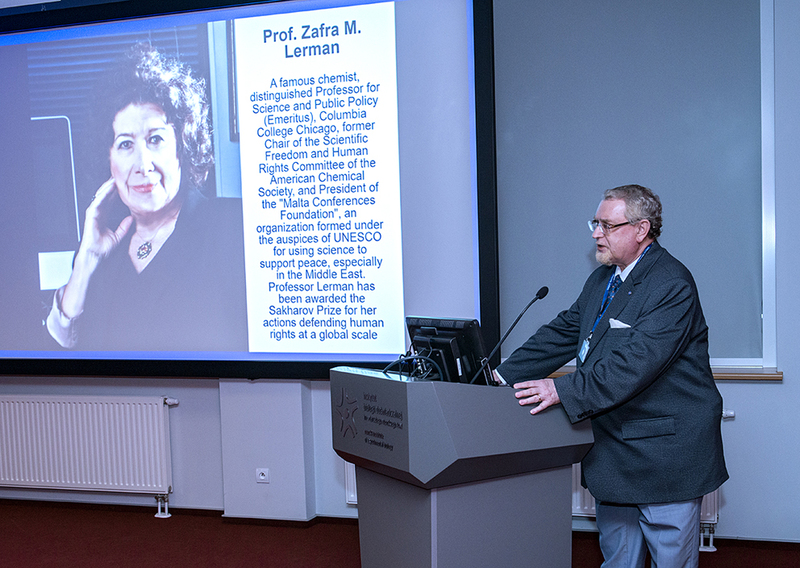"Science Diplomacy" Conference at the Nencki Institute
On Wednesday, November 28th, 2018, the Nencki Institute of Experimental Biology Polish Academy of Sciences, organized a Conference on “Science Diplomacy”. The event took place in the Lecture Hall of the Center of Neurobiology of the Institute and was composed of an introduction to the field, followed by five presentations discussing various aspects of science diplomacy.

The program of the Conference contained presentations by the following speakers:
- Prof. Agnieszka Dobrzyn, Director of the Nencki Institute, Opening and Introduction
- Prof. Zafra Lerman (USA), President of the Malta Conferences Foundation and Laureate of the Sacharov Prize, "Science Diplomacy for Peace in the Middle East - Challenges and Opportunities"
- Ambassador Tomasz Orlowski, former Chief of Protocol of the President of Poland, former Vice Minister of the Polish Foreign Ministry, former Ambassador to France and to Italy, "Politics is a science; diplomacy is an art (Metternich). What is the nature of relation between science and diplomacy?"
- Prof. Jerzy Duszynski, former Director of the Nencki Institute, former Vice-Minister of the Ministry of Higher Education and Science, current President of the Polish Academy of Sciences, “Science policy in the Polish Academy of Sciences”
- Prof. Malgorzata Moleda-Zdziech, director of the Polish Science Contact Agency in Brussels, “Lobbying for science”
- Prof. Maciej Nalecz, former director of the Nencki Institute, former director in UNESCO, Paris, professor at the Nencki Institute - "Science diplomacy in UNESCO: Focus on the SESAME Project”
In the Introduction, Professor Agnieszka Dobrzyn explained that science diplomacy is the use of scientific collaborations among nations, to address common problems, and to build constructive international partnerships. The name "science diplomacy" refers to three main types of activities: 1. “Science in diplomacy”, where science provides advice to inform and support foreign policy objectives; 2. “Diplomacy for science”, where diplomacy facilitates international scientific cooperation; and 3. “Science for diplomacy”, where scientific cooperation improves international relations. The conference focuses on the latter as the most important to the Nencki Institute, since scientific values of rationality, transparency and universality are the same the world over. They can help to underpin good governance and build trust between nations. Furthermore, science provides a non-ideological environment for the participation and free exchange of ideas between people, regardless of cultural, national or religious backgrounds. That is also why science can help solving conflicts. Cooperation on the scientific aspects of sensitive issues such as nuclear non-proliferation, water accessibility, food security or infectious diseases—can provide an effective route to other forms of political dialogue enabling a peaceful co-existence. And this is the essence of “science diplomacy”. Other speakers were discussing science diplomacy from various perspectives. A famous chemist (Prof. Zafra Lerman) showed how scientific collaboration can be used to break cultural and political barriers in the troubled Region of the Middle East. An experienced diplomat (Ambassador Orlowski) described his experience with “soft diplomacy”, i.e. the use of science and culture to attain diplomatic objectives. A Chief of a big national scientific organization (Prof. Jerzy Duszynski) exemplified actions of Polish science that help diplomacy, and his co-worker, Prof. Malgorzata Moleda-Zdziech, spoke about the need of lobbying for science on international political fora as European Commission or European Parliament. An experienced former UN Official, and our Colleague from the Nencki Institute (Prof. Maciej Nalecz) presented how a big intergovernmental organization, UNESCO, implements science diplomacy within its program, to meet the goal set in its Constitution: “Since wars begin in the minds of men, it is in the minds of men that the defense of peace must be constructed".
The Conference was closed by Prof. Agnieszka Dobrzyn, who expressed hope that the Nencki Institute may become more involved, and even lead, some science diplomacy actions in the future.
